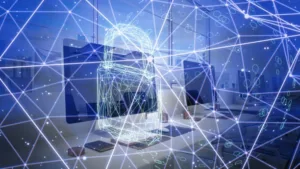Automation:

In a world where technology evolves faster than we can blink, our everyday surroundings are being transformed by the power of artificial intelligence (AI) and machine learning (ML). One area that’s truly on the brink of a major revolution is building automation. Imagine buildings that think, feel, and adapt to our needs. In this journey through AI and ML in construction, we’ll explore how they’re changing the game.
Building Automation in AI and Machine Learning: The Marvellous Evolution

For decades, we’ve had building automation systems that mostly followed a set of rules to control things like lights, heating, cooling, security, and more. But these systems were about as dynamic as a set of instructions written in stone. The game-changer? AI and ML.
Read More: How Building Automation Technology Can Help You Save Money and Energy
AI: The Brain of Building Automation
AI is the wizard behind the curtain, the one who can analyse data and make decisions for a building. It’s like the building’s brain, enabling it to be more responsive, predictive, and adaptive. Here’s how AI is making its mark:
1. Predictive Maintenance: With AI’s help, buildings can predict when they need maintenance. It’s like your building whispering, “Hey, I’ll need a check-up soon!” This saves you time, money, and the headaches of unexpected repairs.
2. Energy Efficiency: AI optimises energy consumption by crunching data to adjust things like heating, cooling, and lighting. It’s like having an energy-saving fairy who ensures your bills go down and your carbon footprint gets lighter.
3. Comfort Zone: AI can make sure the temperature and lighting in your building are just the way you like them. It’s as if the building knows your preferences better than you do, making you more comfortable and productive.
4. Guardian of Security: AI-powered cameras and sensors keep an eye on your building 24/7. They’re like the ever-watchful sentinels that trigger alarms if anything seems off.
5. Space Sleuth: AI can analyse how space in a building is used. It’s like having a detective figure out how to make the most of every square foot, saving space and resources.
Machine Learning: The Building’s Memory and Growth
Machine learning is AI’s sidekick, helping systems learn and adapt over time. It’s like the building’s memory and personal trainer rolled into one:
1. Pattern Recognition: ML helps buildings recognise patterns in data, allowing them to predict future events. It’s like having a crystal ball that tells you when certain rooms will be busy based on historical data.
2. Anomaly Detection: ML can spot unusual behaviour, which could mean a problem, a security breach, or just something not running efficiently.
3. Continuous Improvement: ML gets better at what it does over time. It’s like a fine wine that ages well, becoming more accurate and efficient.
Read More: Exploring the Smart Life-Compatible Switches and Plugs
IoT: The Eyes and Ears of the Building
The Internet of Things (IoT) is what gives the building its senses. Sensors, cameras, and other IoT devices collect loads of data that AI and ML use to work their magic. It’s like the building’s eyes and ears, giving it a real-time view of its surroundings.
The Benefits of AI and ML in Building Automation
The AI and ML duo in building automation offers a treasure trove of benefits:
1. A Greener Future: Buildings become eco-friendly, reducing costs and their environmental footprint.
2. Saving Big Bucks: Predictive maintenance and smart energy usage result in substantial savings.
3. Comfort Redefined: Buildings adapt to the people inside them, making life cosier and more productive.
4. Fort Knox Security: AI-powered systems add an extra layer of security.
5. Data Goldmine: The data collected and analysed by AI and ML isn’t just for show; it’s a goldmine for further optimisation.
Challenges and Considerations of AI and ML in Building Automation
But as with any grand adventure, there are some bumps in the road:
1. Privacy Matters: With great data comes great responsibility. Building owners must ensure data is protected like a treasure.
2. Upfront Costs: Getting AI and ML systems up and running can be pricey. But think of it as an investment in a greener, more efficient future.
3. Making Friends: Integrating new technology with old building systems can be a puzzle. It’s like fitting a square peg into a round hole. Tricky, but not impossible.
4. Know-How Required: People need to know how to manage and maintain AI and ML systems effectively. Training is key.
The Next Frontier for AI and ML in Building Automation?

The next frontier for AI and ML in building automation? It’s all about green, sustainable architecture. Buildings are significant energy hogs and carbon emitters. AI and ML can change that.
AI and ML help design buildings that are energy-efficient from the ground up. They can tweak things like insulation, window placement, and the use of renewable energy sources, making buildings a whole lot greener.
But it doesn’t stop there. AI and ML are helping to create “smart grids” where buildings communicate with the larger energy system. Imagine your building sharing power when it’s not needed, reducing the energy bill for everyone.
Read More: Exploring The Future of Smart Buildings: Where Tech Meets Comfort
Real-Life Marvels of AI and ML in Building Automation
To prove that this isn’t just science fiction, let’s look at some real-life examples:
1. The Edge, Amsterdam: This smart office uses AI, IoT, and ML to create a workspace that’s nothing short of amazing. It knows when you’re coming to work, and it has your perfect temperature and lighting waiting for you.
2. Denver International Airport uses machine learning to predict and tackle maintenance issues, making travel smoother and more enjoyable.
3. Honeywell Forge: This platform uses AI and ML to watch over building systems and make them perform at their best.
Conclusion
AI and machine learning are reshaping our buildings. They’re not just making them smart; they’re making them eco-friendly, comfortable, and secure. The integration of AI and ML in building automation isn’t just a trend; it’s a movement that’s defining the future of our cities and our planet. Imagine buildings that think, feel, and adapt—they’re no longer just structures; they’re alive with possibility.










